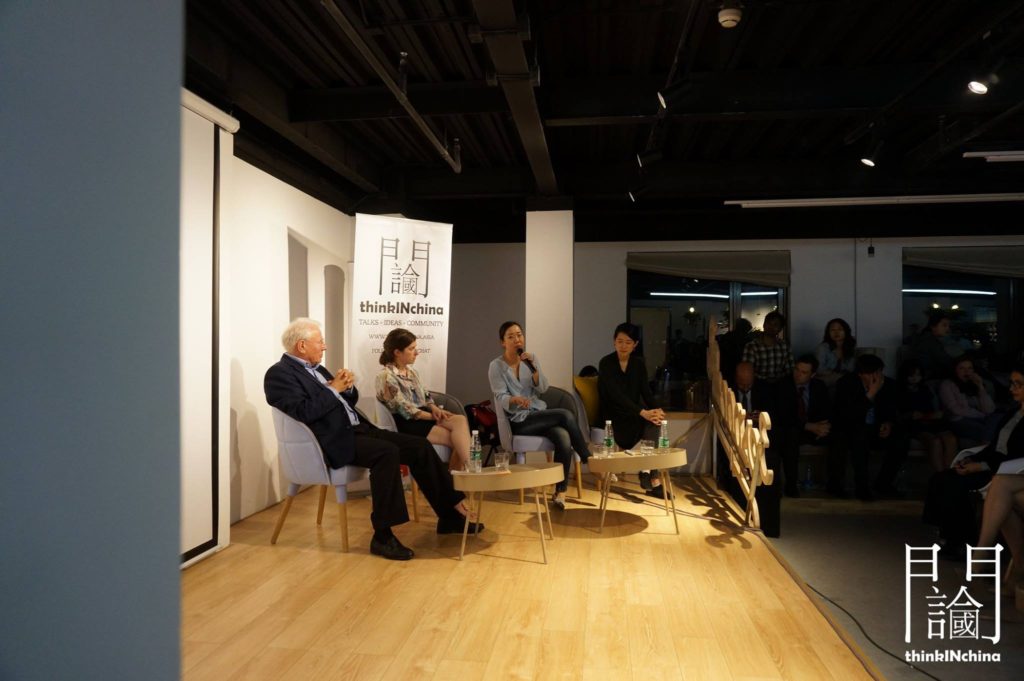
SPEAKERS
Prof. Klaus Leisinger (University of Basel), Maggie Sun (Handicap International), Wu Di (Easy Inclusion), Marina Kalnitski (Inclusion Factory)
For the first time in its history, ThinkIN China journeyed to the Gulou-area to host an event at SANY Foundation’s 3ESPACE venue in Jiaodaokou. The outdoor terrace, offering a panoramic view of the hutongs, helped create a relaxed ambience at the afterparty, during which participants conversed at length with the speakers and other guests. Even though this event was the first in the new location, a large and diverse audience attended, illustrating that ThinkIN China is a brand name capable of attracting people from all corners of the city.
We were delighted to welcome back Professor Klaus Leisinger, a world-renowned expert on sustainable development and corporate responsibility, who is currently the senior adviser for the Karl Schlecht Foundation. He began his speech reminding the audience of the multifaceted manifestations of inequality, as inequality is not just limited to the monetary dimension. Monetary inequality can be offset by services offered by the state, but these services must be financed through taxation. The issue of what is the optimal tax rate can be viewed from various perspectives; indeed, this topic later evoked a vibrant discussion in the Q&A section.
Is it fair to tax wealthy entrepreneurs for the purpose of financing inequality-reducing measures, or will this practice discourage entrepreneurs from reaching their potential and generating more social wealth?
No matter what answer one gives, no approach perfectly applies in all contexts. Professor Leisinger finished by calling on all of us to reflect on what we, as agents capable of initiating change, can do to improve society rather than relying on others to do so.

Maggie Sun of Handicap International introduced some of the major challenges facing NGOs working on inequality-reduction in China. The focus of her speech was on disability-related discrimination, with examples drawn from the case-study of Handicap International. For donation-dependent organizations, China’s economic development makes it more difficult to attract funding. Donors need to be convinced that even though China has experienced an incredible economic boom and may no longer qualify as a ‘developing country’, the societal hurdles affecting disabled people remain significant. When thinking about disabilities, most people will have physical impairments in mind, but this is only part of the picture.
Moreover, even those with more visible forms of disability are rarely seen in daily life in China.
They have very limited access to the job market and to education opportunities. Holistic approaches aimed at addressing these challenges are scarce, leading to desperate situations for a clear majority of people with disabilities, especially those living in rural areas. The United Nations Sustainable Development Goals, on which Professor Leisinger has worked extensively, give NGOs in China a new tool to advance their agenda and demand more action from governments.
Marina Kalnitski introduced Inclusion Factory, an economically self-sustainable workshop in Taicang, Jiangsu province, aimed at increasing participation rates of intellectually and mentally-challenged persons in the private sector. To guarantee long-term sustainability, the workshop is organized on a for-profit basis; the organizers hope to promote this model across China. The reason for a for-profit model is very simple: donations cannot be expected to flow in the long-term, so the longevity of a project depends on respect for social principles as well as business principles. Notably, this creates three major challenges. First, the lack of awareness on disability issues, particularly by middle-ranking managers. This can be overcome by demonstrating that the quality and price of products created by those with disability can be competitive. This already hints at the second challenge: staying competitive while working at a slower pace, or ‘turtle speed’. Partnering up with other companies is key; for Inclusion Factory, this means getting customized machinery suitable for its employees. Finally, the role of the government needs to be stressed. Without government support for social enterprises, the goal of increasing inclusion will remain a far-distant one.
Wu Di from Easy Inclusion moved the conversation in a different direction by highlighting the imperfection of existing definitions of disability. The key to diminish exclusion is not only to focus on ‘fixing’ facts, but also to remove barriers in society. Companies should understand that inclusion pays off in economic terms. Inclusion will increase the diversity of ideas and hence lead to more innovation; moreover, it will help create a better working environment. While quotas set by the government create further financial incentives, without a genuine belief in the ability of persons with disabilities, the efforts to meet the quota can be tokenistic. For inclusion to really take off in China, the public will need to change its attitudes and increase its awareness of this issue. In the end, it comes down to every single one of us becoming more open and inclusive. And with such an amazing crowd participating, there is a lot of hope!
Written by Nico Wrobel